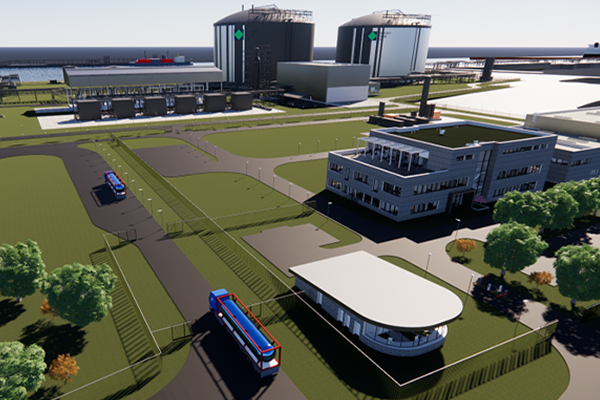FCC Industrial obtains permission to develop the construction of the first liquefied gas onshore terminal in Stade, Germany
FCC Industrial obtains permission to develop the construction of the first liquefied gas onshore terminal in Stade, Germany

FCC Industrial obtains permission from the Hanseatic Energy Hub GmbH consortium to build Germany's first liquefied gas onshore terminal. The contract to build the terminal in the Stade industrial park in Germany was awarded to FCC Industrial, Técnicas Reunidas and Enka. The estimated investment in the construction is approximately 1,000 million euros.
The Hanseatic Energy Hub, which is scheduled for commissioning in 2027, will contribute to ensuring Europe's energy supply security. In the first phase, HEH will serve as an import terminal for liquefied natural gas (LNG), synthetic natural gas (SNG) and liquefied biomethane; subsequently, it will be adapted for renewable ammonia, a carbon-neutral, hydrogen-based energy carrier.
The Hanseatic Energy Hub will have a total capacity of 13.3 billion cubic metres (bcm) of natural gas per year. Ninety per cent of this volume has already been contracted on a long-term basis by three major European energy companies: EnBW, SEFE and ČEZ.
Técnicas Reunidas will design the regasification terminal and the two storage tanks, each with a capacity of 240,000 cubic metres, and will carry out all the equipment and materials supply work for the project. This project is part of Técnicas Reunidas' long experience and know-how in the design and development of this type of plant, aimed at optimising performance and minimising environmental impact.
FCC Industrial, with extensive experience in the construction of Liquefied Natural Gas (LNG) tanks, will build the tanks. It will also carry out all the site preparation and civil works activities for the plant. The company has designed, built and commissioned several LNG storage plants in Spain, Finland and Chile. Specifically, in Spain it has executed 8 LNG facilities with a capacity to supply 1.53 million homes thanks to the storage of 1.1 Mm3 of LNG.
This terminal is an important element of Germany's current energy policy, which has among its main objectives to diversify its natural gas supply with liquefied natural gas (LNG) and "green gases", while preparing for the take-off of hydrogen in the market.




